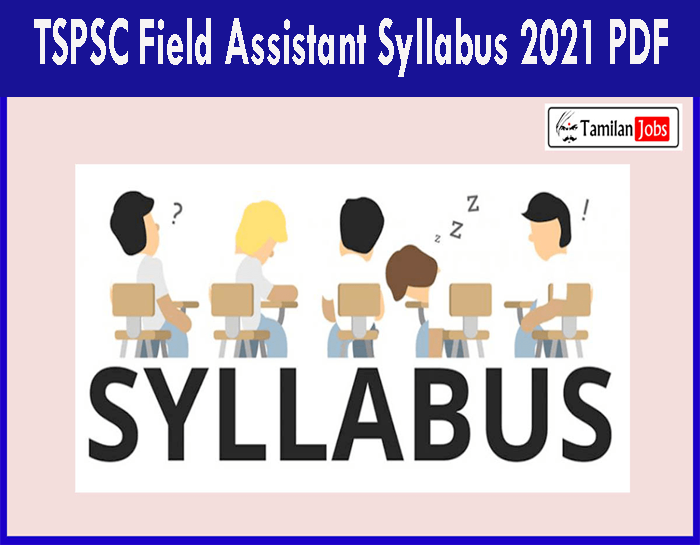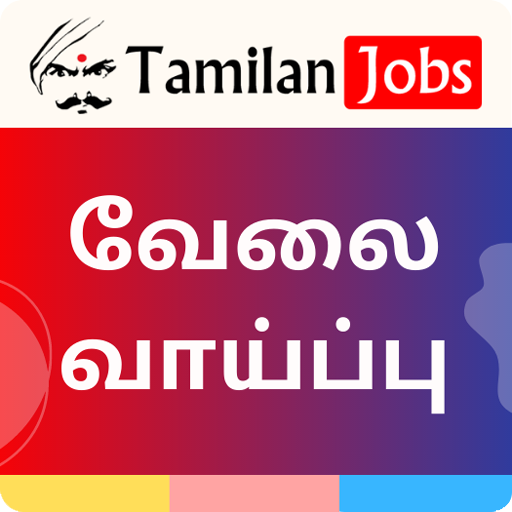TSPSC Field Assistant Syllabus 2021 PDF & Download Exam Pattern: Are you searching for TSPSC Field Assistant Syllabus? If Yes, You are in the right place. Telangana State Public Service Commission (TSPSC) has officially released the Field Assistant Posts Recruitment. The candidates eagerly check and prepare for the examination. So, we provided the TSPSC Field Assistant Syllabus 2021 to score more marks in the TSPSC Field Assistant Exam. Not only the TSPSC Field Assistant Syllabus pdf you can also get the TSPSC Field Assistant Exam Pattern from this page. So, candidates can prepare for the TSPSC Field Assistant Exam 2021 without any disturbance. To the bottom of this page, you can easily get the TSPSC Field Assistant Syllabus 2021 PDF & Exam Pattern for Subject Wise Syllabus in PDF Format. The candidates can use this article to get more marks and ideas about the examination.

TSPSC Field Assistant Syllabus 2021 PDF Download – Details
| TSPSC Field Assistant Syllabus 2021 PDF & Download Exam Pattern | |
|---|---|
| Organization Name | Telangana State Public Service Commission (TSPSC) |
| Post Name | Field Assistant |
| Category | Syllabus |
| Syllabus | Released |
| Job Location | Telangana |
| Official website | www.tspsc.gov.in |
TSPSC Field Assistant Exam Pattern 2021
| PAPER | Subject | No. of Questions |
Duration (Minutes) |
Maximum Marks |
|
1. |
General Knowledge and Biological Sciences (Intermediate Level) |
150 (General Knowledge 75 + Biological Sciences 75 (Intermediate Level)) |
150 | 150 |
| Name of the Papers | Language of Examination |
| Paper: General Knowledge and Biological Sciences (Intermediate Level) | Bilingual i.e., English and Telugu |
TSPSC Field Assistant Syllabus PDF Download
Paper: General Knowledge and Biological Sciences (Intermediate Level)
General Knowledge
- Current
- International Relations and
- General Science in everyday
- Environmental Issues and Disaster
- Geography and Economy of India and
- Indian Constitution: Salient
- Indian Political System and
- Modern Indian History with a focus on Indian National
- History of Telangana and Telangana
- Society, Culture, Heritage, Arts and Literature of
- Policies of Telangana
Biological Sciences (Intermediate Level) Botany
Diversity of Plant World
Branches of Botany-Plant Kingdom- Salient features, classification and alternation of generations of the plants of the following groups-Algae, Fungi, Bryophytes, Pteridophytes, Gymnosperms and Angiosperms.
Morphology – Morphology of flowering plants: Vegetative
Parts of a typical Angiospermic plant; Vegetative morphology and modifications-Root, stem and Leaf – types; Venation, Phyllotaxy. Reproductive: Inflorescence-Racemose, Cymose and Special types (in brief)- Flower: Parts of a flower and their detailed description; Aestivation, Placentation-Fruits: Types – True, False and parthenocarpic fruits.
Plant Systematics – Taxonomy of Angiosperms
Introduction, Types of Systems of classification (In brief), Description of Families: Fabaceae, Solanaceae and Liliaceae.
Cell Structure And Function
The Unit of Life- Cell-Cell theory and cell as the basic unit of life- overview of the cell., Prokaryotic cells, Ultrastructure of Plant cell (structure in detail and functions in brief), Cell membrane, Cell wall, Cell organelles; Endoplasmic reticulum, Mitochondria, Plastids, Ribosomes, Golgi bodies, Vacuoles, Lysosomes, Microbodies and Nucleus, Chromosomes: Number, structural organization; Nucleosome, Cell cycle and Cell Division- Cell Cycle, Mitosis, Meiosis- significance.
Plant Physiology – Transport in Plants
Diffusion, Active Transport, Plant-Water Relations, Translocation of Mineral Ions. Mineral Nutrition: Role of Macro & Micro Nutrients, Deficiency symptoms of essential elements. Enzymes: Chemical Reactions, nature of enzyme action, Classification and Nomenclature of Enzymes. Photosynthesis: Cyclic and Non-cyclic Photo-phosphorylation, Calvin cycle. Respiration of Plants: Glycolysis, Tricarboxylic Acid Cycle, Electron Transport. Plant Growth and Development: Auxins, Gibberellins, Cytokinins, Ethylene and Abscisic Acid.
Microbiology – Bacteria
Morphology of Bacteria, Bacterial cell structure- Nutrition, Reproduction – Sexual Reproduction, Conjugation, Transformation, Transduction.
The importance of Bacteria to Humans – Viruses
Discovery, Classification of viruses, Structure of Viruses, Multiplication of Bacteriophages- The Lysogenic cycle, Viroids, Prions, Viral diseases in Plants, Viral diseases in Humans.
Ecology & Environment
Ecosystem: Biotic and Abiotic factors, types and components of the ecosystem, food chains, food Web, Energy flow and Ecological pyramids. Carbon, Nitrogen & Phosphorous cycles. Population attributes Growth, Natality and Mortality, Age distribution, Population regulation. Flora and Fauna of Telangana.
Zoology
Zoology – Diversity of Living World
- Branches of Zoology; Basic principles of Classification: Biological system of classification
- Species concept
- Biodiversity – Meaning and distribution (Genetic and Species Diversity, Ecosystem diversity), other attributes of biodiversity, the role of biodiversity, threats to biodiversity, methods of conservation, IUCN Red data books, Conservation of wildlife in
Structural Organization In Animals
- Levels of organisation, Multicellularity: Diploblastic & Triploblastic: types of Symmetry
- Tissues: Epithelial, Connective, Muscular and Nervous
Animal Diversity
General characteristics and classification up to classes – Porifera, Cnidaria, Ctenophora, Platyhelminthes, Nematoda, Annelida, Arthropoda, Mollusca, Echinodermata, Hemichordata and Chordata – Protochordates, Pisces, Amphibia, Reptiles, Aves and Mammalia.
Biology & Human Welfare
- Parasitism and parasitic adaptation
- Health and disease: Life cycle, Pathogenicity, Treatment & Prevention: Entamoeba, Plasmodium, Ascaris, Wuchereria
- Drugs and Alcohol
Human Anatomy and Physiology
- Digestion and absorption: Nutritional disorders: Protein Energy Malnutrition (PEM),
- Breathing and Respiration: Respiratory disorders: Asthma, Emphysema, Occupational respiratory
- Body Fluids and Circulation: Disorders of circulatory system: Hypertension, coronary artery disease, angina pectoris, heart
- Excretory products, their elimination and
- Muscular and Skeletal system: Generation and conduction of nerve impulse; Reflex action; Sensory perception; Sensory
- Endocrine system: Hypo and Hyperactivity and related disorders: Dwarfism, acromegaly, cretinism, goitre,
- Immune system: Basic concepts of Immunology – Innate Immunity, Acquired Immunity, Active and passive Immunity, cell medicated Immunity and Humoral Immunity, HIV and
- Reproductive Health: Reproductive health and STD; Birth control, contraception and medical termination of pregnancy; Amniocenteses; IVF-EF, ZIFT,
Genetics and Evolution
- Principles of Mendelian inheritance, Multiple alleles, Sex Determination, Sex-linked inheritance, Metabolic and Chromosomal
- Origin of Life, Evidence for biological evolution, Theories of evolution: Lamarckism, Darwin’s theory of Evolution – Natural Selection with an example; Modern synthetic theory of Evolution; Gene flow and genetic drift; Adaptive radiation; Speciation – Allopatric, sympatric; reproductive
Applied Biology
Bio-medical Technology: Diagnostic Imaging (X-ray, CT scan, MRI), ECG, EEG, Application of Biotechnology in health: Human insulin and vaccine production; Gene Therapy; ELISA; Vaccines, MABs, Cancer biology, stem cells. Single-cell protein (SCP), Tissue culture –Microbes in Human Welfare–Microbes in Household products, Microbes in Industrial products- Fermented Beverages, Antibiotics, Chemicals, Enzymes and other Bioactive Molecules, Microbes in production of Biogas, Microbes as Biocontrol Agents, Biological control of pests and diseases, Microbes as Bio fertilisers.
Candidates keep in touch with the TAMILANJOBS website for more information regarding Jobs, Exams, results and other details.

